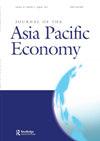Navigating LDC graduation: modelling the impact of RCEP and CPTPP on Bangladesh
IF 1.5
4区 经济学
Q3 ECONOMICS
引用次数: 1
Abstract
Bangladesh will graduate from the LDC list by 2026. Currently Bangladesh's exports of readymade garments (RMG) benefit from international support measures which allows preferential trade in major export destinations, such as the EU. After graduation, Bangl adesh’s exports, in particular RMG, will face competition from mega trading blocs, such as RCEP and CPTPP. This paper employs a CGE GTAP model to estimate the impact of Bangladesh's graduation from the LDC category and how mega FTAs are likely to affect Bangladesh's exports (sectoral and total) and potential welfare. The model also considers the scenarios of either USA or the UK, or both joining the CPTPP. The model results show that Bangladesh’s graduation will lead to a fall in GDP and RMG exports by 1.53 % and 11.8%, respectively. The negative impact is magnified when we factor in the mega-trading blocs. Further negative impacts are observed when either USA or the UK, or both join the CPTPP.导航最不发达国家毕业:模拟RCEP和CPTPP对孟加拉国的影响
到2026年,孟加拉国将从最不发达国家名单中毕业。目前,孟加拉国的成衣出口受益于国际支持措施,这些措施允许在欧盟等主要出口目的地进行优惠贸易。毕业后,孟加拉国的出口,特别是RMG,将面临来自RCEP和CPTPP等大型贸易集团的竞争。本文采用CGE GTAP模型来估计孟加拉国脱离最不发达国家类别的影响,以及大型自由贸易协定可能如何影响孟加拉国的出口(部门和总量)和潜在福利。该模型还考虑了美国或英国,或两者都加入CPTPP的情景。模型结果显示,孟加拉国的毕业将导致GDP和RMG出口分别下降1.53%和11.8%。当我们考虑到大型贸易集团时,负面影响会被放大。当美国或英国或两者都加入CPTPP时,会观察到进一步的负面影响。
本文章由计算机程序翻译,如有差异,请以英文原文为准。
求助全文
约1分钟内获得全文
求助全文
来源期刊

Journal of the Asia Pacific Economy
ECONOMICS-
CiteScore
3.70
自引率
7.10%
发文量
58
期刊介绍:
Journal of the Asia Pacific Economy (JAPE) is concerned primarily with the developing economies within Pacific Asia and South Asia. It aims to promote greater understanding of the complex factors that have influenced and continue to shape the transformation of the diverse economies in this region. Studies on developed countries will be considered only if they have implications for the developing countries in the region. The journal''s editorial policy is to maintain a sound balance between theoretical and empirical studies. JAPE publishes research papers in economics but also welcomes papers that deal with economic issues using a multi-disciplinary approach. Submissions may range from overviews spanning the region or parts of it, to papers with a detailed focus on particular issues facing individual countries. JAPE has a broad readership, which makes papers concerned with narrow and detailed technical matters inappropriate for inclusion. In addition, papers should not be simply one more application of a formal model or statistical technique used elsewhere. Authors should note that discussion of results must make sense intuitively, and relate to the institutional and historical context of the geographic area analyzed. We particularly ask authors to spell out the practical policy implications of their findings for governments and business. In addition to articles, JAPE publishes short notes, comments and book reviews. From time to time, it also publishes special issues on matters of great importance to economies in the Asia Pacific area.
 求助内容:
求助内容: 应助结果提醒方式:
应助结果提醒方式:


